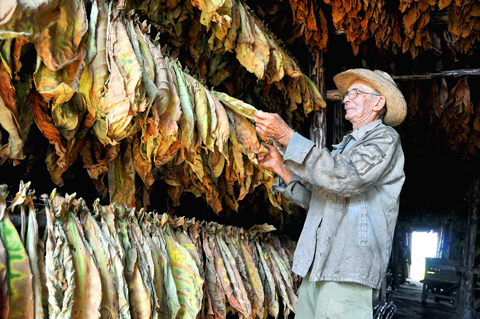“I’m always scared,” said Pedro as he deftly twisted large tobacco leaves to make fake famous name Havana cigars in a clandestine workshop in the Cuban capital.
If caught in his illegal workshop, known as a chinchal, Pedro could face a prison term.
“It’s not a business, but a necessity to survive,” Pedro said in the dim light of the dilapidated building.

PHOTO: AFP
With long-suffering Cuba hard hit by the economic crisis and pounded by two hurricanes last year, the government has stepped up its fight against illegal trade, including in cigars.
Sales in the famous smokes fell 3 percent last year, a report released at a Havana trade show last month showed.
But workers such as Pedro do not plan to give up their lucrative business any time soon despite the risks.
The 33-year-old, sporting an earring and a tracksuit, learned his craft in state factories, making famous brands such as Cohiba, Romeo y Julieta or Montecristo cigars.
He used to earn the country’s average monthly wage of US$17, but he declined to reveal the size of his pay rise since turning to the black market five years ago.
Pedro’s skilled hands make around 100 cigars a day, and a box of 25 sells for between US$30 and US$40, four or five times below the official price.
Cuban President Raul Castro’s government recently underlined the need to defend the values of the island’s 50-year-old revolution in its campaign against corruption, which impacts on an annual tobacco income of US$390 million.
“Forgeries and the black market are two scourges which really affect the image of Havana cigars on the one hand because the products are false and on the other because they affect the distribution network that we’ve built up,” said Adargelio Garrido, legal director of the Anglo-Cuban group Habanos.
Each traveler to Cuba is allowed to take home up to two boxes of cigars, but authorities still confiscate between 1,500 and 1,700 boxes per month made in illegal workshops like Pedro’s.
A small cement staircase leads to the crumbling workshop, which operates with a network of helpers.
Farmers from the western Pinar del Rio Province — birthplace of Cuba’s prestigious tobacco — provide the leaves, while factory workers steal wooden boxes, paper rings and other official stamps and certificates.
“It’s not that difficult to get supplies from factories because all the administrative services work separately, so they’re not suited to check ups,” said 42-year-old Juan, one of many clandestine retailers.
Pedro said he turned to the illegal trade five years ago when his father fell sick. He set up the operation in the elderly man’s home and turned one room into an illegal workshop.
“No one knows what I’m doing here, not even members of my family. It’s very dangerous,” he whispered as he mechanically lined up cigars on a table, surrounded by tobacco leaves scattered on the floor.
“I’d like to give it up, or work outside Cuba where you get paid for the value of your work,” Pedro said.

To many, Tatu City on the outskirts of Nairobi looks like a success. The first city entirely built by a private company to be operational in east Africa, with about 25,000 people living and working there, it accounts for about two-thirds of all foreign investment in Kenya. Its low-tax status has attracted more than 100 businesses including Heineken, coffee brand Dormans, and the biggest call-center and cold-chain transport firms in the region. However, to some local politicians, Tatu City has looked more like a target for extortion. A parade of governors have demanded land worth millions of dollars in exchange

Hong Kong authorities ramped up sales of the local dollar as the greenback’s slide threatened the foreign-exchange peg. The Hong Kong Monetary Authority (HKMA) sold a record HK$60.5 billion (US$7.8 billion) of the city’s currency, according to an alert sent on its Bloomberg page yesterday in Asia, after it tested the upper end of its trading band. That added to the HK$56.1 billion of sales versus the greenback since Friday. The rapid intervention signals efforts from the city’s authorities to limit the local currency’s moves within its HK$7.75 to HK$7.85 per US dollar trading band. Heavy sales of the local dollar by

Taiwan Semiconductor Manufacturing Co’s (TSMC, 台積電) revenue jumped 48 percent last month, underscoring how electronics firms scrambled to acquire essential components before global tariffs took effect. The main chipmaker for Apple Inc and Nvidia Corp reported monthly sales of NT$349.6 billion (US$11.6 billion). That compares with the average analysts’ estimate for a 38 percent rise in second-quarter revenue. US President Donald Trump’s trade war is prompting economists to retool GDP forecasts worldwide, casting doubt over the outlook for everything from iPhone demand to computing and datacenter construction. However, TSMC — a barometer for global tech spending given its central role in the

The Financial Supervisory Commission (FSC) yesterday met with some of the nation’s largest insurance companies as a skyrocketing New Taiwan dollar piles pressure on their hundreds of billions of dollars in US bond investments. The commission has asked some life insurance firms, among the biggest Asian holders of US debt, to discuss how the rapidly strengthening NT dollar has impacted their operations, people familiar with the matter said. The meeting took place as the NT dollar jumped as much as 5 percent yesterday, its biggest intraday gain in more than three decades. The local currency surged as exporters rushed to